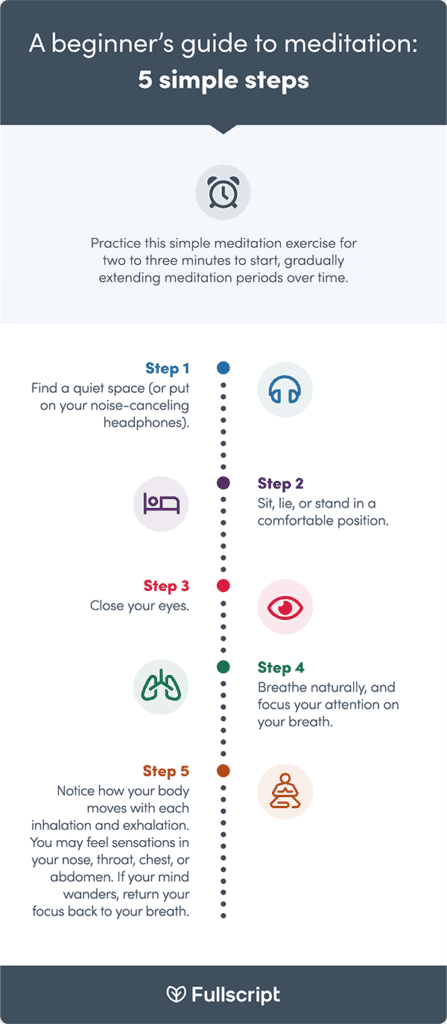
Why Meditate?: 7 Health Benefits of Meditation
Share
If you experience stress, anxiety, insomnia, chronic pain, or poor concentration, incorporating a daily meditation practice may help. Meditation is a practice that can take time to master, but the good news is that you don’t need to be an expert to reap the benefits. Continue reading to learn about the many evidence-based health benefits of meditation.
What is meditation?
The term meditation loosely describes various practices and techniques, including prayer, concentration, contemplation, breath manipulation, visualization, sound use, mantra (repeated word or sound), and intentional movement (e.g., yoga, tai chi). Each meditation technique can help you tap into your senses and emotions. (22)
Meditation is a virtually risk-free and cost-effective practice that people of all ages can do with a little patience and guidance. If you’re new to meditation and unsure where to start, there are several meditation apps, websites, and online videos that provide free or low-cost guided meditation instruction. One may also choose to incorporate CBD Oil into his or her daily routine to boost concentration and reduce inflammation in the body.

7 evidence-based health benefits of meditation
Decades of research have demonstrated the many health benefits of meditation.
1. Promotes better sleep
If you struggle to fall or stay asleep, incorporating meditation into your daily routine may help. A meta-analysis concluded that mindfulness meditation, a practice that involves breathing exercises and awareness of internal and external sensations, may improve sleep parameters, such as sleep quality, efficiency, and latency (the time it takes to fall asleep), in individuals with insomnia. (3)
Research has also shown that individuals with over a decade of meditation experience have enhanced rapid eye movement and spend considerably more time in the slow-wave sleep phase. As a result, individuals who meditate sleep more deeply and enjoy more restorative sleep. (14)
Interestingly, meditation has also been shown to improve melatonin levels, a hormone secreted by the pineal gland that helps regulate the sleep-wake cycle. (14)
2. Reduces stress and anxiety
One of the most popular reasons people choose to meditate is to relieve stress and anxiety. (4) The latest research provides promising results. For example, a meta-analysis showed a significant improvement in anxiety among highly stressed individuals and patients with chronic anxiety whose anxiety levels ranked in the 80th to 100th percentile range. Following the meditation intervention, anxiety levels of the participants fell between the 53rd to 62nd percentile range. (18)
Meditation may also improve quality of life and reduce symptoms of post-traumatic stress disorder (PTSD). (11) A small eight-week trial found that meditation practice effectively reduced perceived levels of stress and improved mood. (6)
Did you know? Meditation may lower blood serum levels of cortisol, the body’s primary stress hormone. (21)
3. Improves symptoms of depression
According to recent research, meditation may be used as an adjunctive therapy option for patients with clinical depression. In a six-week trial conducted in 2019, students who meditated daily experienced a decrease in symptoms of depression compared to a control group that did not meditate; however, these effects only persisted in individuals who continued to practice daily meditation post-intervention. (1)
4. Relieves pain
Preliminary research suggests meditation as a potential therapy for individuals experiencing chronic pain. Although more research is needed to make conclusions, it’s believed that meditation reduces the perception of pain by increasing awareness, redirecting the mind’s attention, and promoting acceptance and coping. (5)(24) Further research suggests that meditation may be a beneficial practice for patients experiencing pain and discomfort related to several chronic illnesses, including fibromyalgia, migraine, and irritable bowel syndrome. (26)
Following a ten-week mindfulness meditation program, 65% of subjects reported at least a 33% reduction in pain since the beginning of the trial. (9)

5. Boosts memory and protects against cognitive decline
Practicing daily meditation may help improve memory and slow age-related cognitive decline. Following an eight-week meditation program for individuals with memory issues, participants in one study experienced a significant improvement in memory as well as improved scores on the Trail-Making Test B assessment, a screening tool for dementia. Furthermore, the trial identified a substantial increase in cerebral blood flow to several parts of the brain responsible for memory, including the prefrontal, superior frontal, and superior parietal cortices. (16)
The results of a randomized controlled trial indicated that meditation significantly improves memory and boosts cognitive performance in individuals with subjective cognitive decline, an early sign of dementia and Alzheimer’s disease characterized by self-reported memory loss or confusion. (7)
Long-term meditation may even alter the structure of your brain. As you age, your brain’s cortical thickness shrinks, which can affect memory and executive function. (22) One study determined that regular meditation is associated with increased cortical thickness and may slow age-related thinning of the frontal cortex. (12)
6. Sharpens focus and concentration
Do you have trouble staying focused on a single task? Research suggests that shortly after practicing meditation, your ability to focus and concentrate on a task improves. (13) Meditating for only ten minutes may have an immediate positive effect on your attention. (17)
As mentioned previously, meditation increases blood flow to the brain, which can also boost brain performance. (22) A 2012 cross-sectional study comparing meditating and non-meditating senior adults determined that meditation can positively affect attention and processing speed, particularly in people who have been meditating for more than ten years. (19)
Short-term meditation practice has also been shown to improve focus and concentration, even in individuals with no prior experience with meditation. Evidence shows that meditation training significantly improves working memory, executive function, and sustained attention in as little as four days of practice. (25)
7. Supports cardiovascular health
A meta-analysis of 19 studies determined that meditation may be an effective strategy for lowering both systolic and diastolic blood pressure. (23) Meditation may also have protective effects against cardiovascular disease by improving blood cholesterol levels. (20)
Several studies have demonstrated the usefulness of meditation for reducing heart rate and increasing heart rate variability, two indicators of cardiovascular health. (2) Meditating for only five minutes per day for a total of ten days has been shown to improve heart rate variability. (10)
The bottom line
The simple practice of daily meditation can help improve your physical and mental health by reducing stress and anxiety, promoting better sleep, boosting cognitive function, and improving cardiovascular health. Research reveals that beginners and long-term meditators alike can benefit from daily meditation, no matter their skill level. Speak to your integrative healthcare practitioner about incorporating meditation into your wellness plan.


